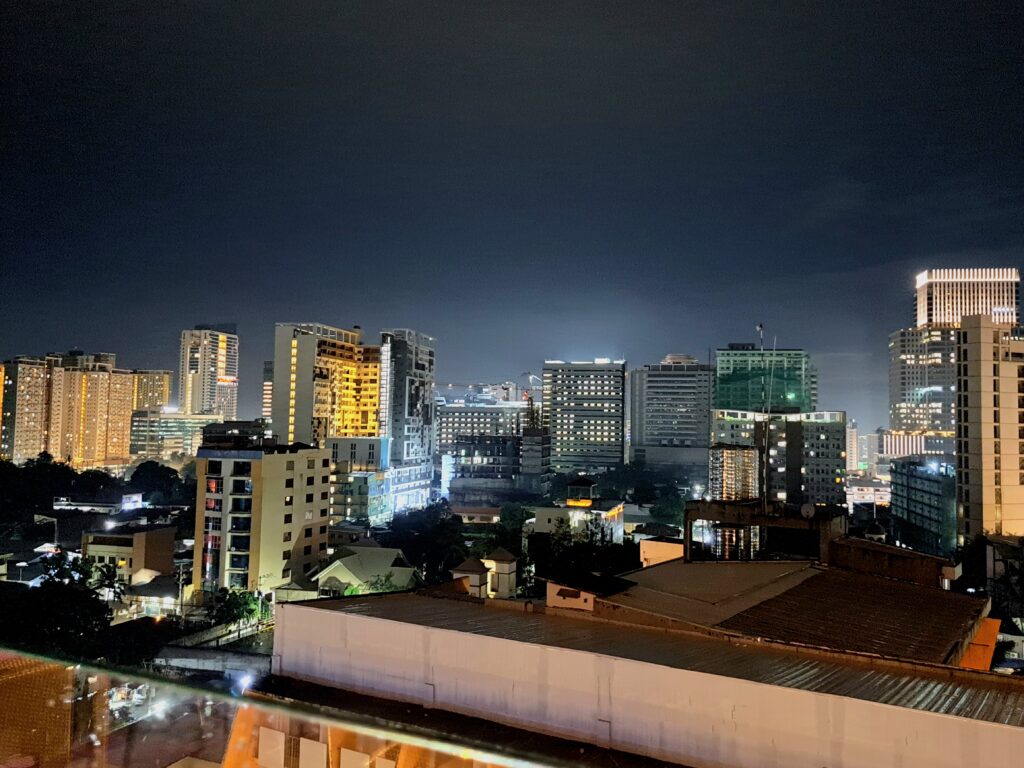
Night view of the skyscrapers at Cebu IT Park, home to the city’s biggest local and global outsourcing companies operating here. Throughout the years, the industry has generated thousands of jobs and investments in Cebu.| CDN Digital photo by Carl Lorenciana
CEBU CITY, Philippines – The Contact Center Association of the Philippines (CCAP) projects continued robust growth for the Cebu’s information technology and business process management (IT-BPM), a sector that’s been one of the province’s key economic drivers for many years now.
Industry leaders are optimistic that Cebu, being the primary BPO hub outside Metro Manila, will experience ongoing industry expansion, resulting in the creation of new jobs.
“People are still coming to Cebu,” said CCAP board director Haidee Enriquez in an interview days before Cebu’s hosting of one of the country’s largest conferences for the IT-BPM sector, the Contact Islands 2024, on July 24-26. CCAP is the umbrella organization of the contact center and business process outsourcing sector with 154 member-firms within the Philippine IT-BPM industry.
Although Cebu is already considered a “mature” BPO hub, Enriquez expressed confidence that it will continue to attract investments, particularly in the expansion of existing outsourcing companies here.
“There’s so much growth to be had (in Cebu),” she said. She added that as long as Cebu remains business-ready, maintains its infrastructure, and continues to produce talent, it will sustain its robust growth in the IT-BPM space.
Enriquez, who is also chief executive officer of MicroSourcing, a company that employs thousands in the country, noted that a clear indication of the positive industry prospects is the sustained hiring requirements of outsourcing companies. The key challenge now, she noted, is determining how quickly Cebu can still grow this sector.
Enriquez highlighted the significant contributions of the IT-BPM industry to the local economy, particularly in terms of spending. She described the IT-BPM industry as a “potent economic driver,” emphasizing its multiplier effect on other sectors of the economy, including those not directly involved in the industry.
Contact Islands in Cebu
As Cebu prepares to host the Contact Islands 2024, industry stakeholders remain bullish about the future, banking on the province’s business readiness, solid infrastructure, and talent pool to drive further growth in the IT-BPM sector.
Mitch Locsin, chairman of CCAP, noted that this year’s Contact Islands conference is especially timely and interesting due to emerging challenges and opportunities, particularly because it is being hosted in the country’s largest BPO center outside the capital.
“The customer experience that our industry provides is the embodiment of our collective vision and concerted actions. Through the years, the Philippines, being the primary provider of excellent contact center and outsourced business processes to the world, has served as the heart of customer experience. We have already weathered numerous storms, but we have to continuously and relentlessly face many more inevitable and unexpected challenges,” he added.
The conference will gather key industry leaders, national and local government heads, members of the academe, thought leaders, customer experience officers, and technology providers, among others.
The world continues to live in very interesting times. Pressing global issues like the proliferation of artificial intelligence (AI), volatility in international economic tides, and the political upheavals in the US and other developed countries are undoubtedly bearing impact on important industries, including the IT-BPM industry, which is one of the active revenue generators of the Philippine economy, Locsin said.
READ: AI impact on IT-BPM industry fuels future growth
IT-BPM sector revenues may hit $40B in 2024, says IBPAP
New and interesting developments—locally and internationally—are keeping the country’s IT-BPM industry on its toes, he added. On track towards achieving the Philippine IT-BPM Roadmap 2028 objectives, he noted the sector remains steadfast in upholding its commitment to make Philippine BPO firms more adaptable, resilient, and proactive in their approach towards bringing excellent customer experience to the world.
Despite facing competition from other strong IT-BPM countries such as India and its Southeast Asian neighbors, the Philippines maintains key advantages like cultural affinity with the US, strong communication skills in its workforce, and a favorable demographic profile.
Significant sector
The contact center and IT-BPM sector accounts for about 83 percent of the entire IT-BPM industry revenue annually.
Based on data from global research company Everest Group, the contact center and IT-BPM sector posted US$29.5 billion revenue in 2023, equivalent to almost 83 percent of the US$35.5 billion revenue of the entire IT-BPM industry. It employed 1.51 million full-time enployees (FTEs) in the same year, accounting for 89 percent of the 1.70 million FTEs of the whole IT industry.
By the year 2028 (based on the IT Industry Roadmap), the sector is projected to account for about US$49 billion of a target US$59 billion IT industry revenue and projected to be manned by about 2.5 million FTEs.